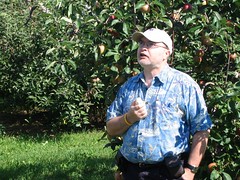
I've avoided some tough questions in my blog about rectal cancer. Hard to believe, you might say, if you've been with me since November 25th, 2005. After all, I've written about medical technology, about treatment, about emotional highs and lows, about research, about happiness and irritation, about medical mistakes, about organizations and other individuals, about books and articles, about diet and nutrition and exercise. True, but for some other things - some of the truly tough and often embarrassing things - I may only have made allusions or offered hints of troubles.
I guess that's natural enough. One always risks "over sharing" when talking about personal medical experiences. But then again, some of those who comment on my blog or email me or call me on the phone, do so because of my apparent honesty and forthrightness in describing my experiences. The casual visitor, some extended family members, friends, and acquaintances who come here are admittedly not particularly interested in some of the details of my experience. And rightly so. This is not easy stuff to write about and it's certainly not easy stuff to read.
If you're a casual visitor, then perhaps this post is not for you. If you've recently been diagnosed with rectal cancer and are considering your options for treatment, then stick with me.
Surgically, you have to think in terms of trade-offs. You can have a colostomy with a permanent stoma and a bag at your side for the rest of your life (an abdominoperineal resection, APR), or you can elect (some might say, if you're lucky) to have what is called a low anterior resection (LAR), an operation which is intended to preserve as much natural function as possible. What natural function? Sexual function, urinary function, and bowel function. I opted for the LAR and had the surgery performed on March 28th, 2006.
The whole point surgically of the LAR - apart from getting the tumor and mesorectum removed with a clear margin - is to save natural function. Not much of a choice, right? Maybe.
When I made my surgical treatment decision, the overwhelming motivation was simply survival, whatever the outcomes. Assuming survival, then my assumption was that an attempt to preserve natural function was better than a colostomy. Unfortunately, I cannot say that I thought much about functional impairments. It's embarrassing to talk about these things, but for anyone considering surgical treatment options, my advice is to try to think carefully about the implications. In fact, recent research has shown that patients have different approaches to the tradeoffs involved.
Sexual Function
My experience since surgery is simple. Sexual function is impaired. Decreased sexual interest, dry orgasms, and difficulty achieving orgasm are par for the course these days. There...I've said it. Now, I have to deal with it.
Urinary Function
The LAR (low anterior resection) is meant to preserve urinary function, although there is always the risk of impairment simply because of the proximity of nerves and muscles controlling sexual, urinary, and bowel function. My experience was not too bad. There was initial loss of urinary function, followed by painful bladder spasms, and then, after release from hospital, an extended period of self-catheterization and gradual recovery of function. Today, it's safe to say that not all function has returned fully, but a couple nightly trips to the washroom strictly to relieve my bladder isn't too high a price.
Bowel Function
Here's my biggest disappointment and frustration, even more than my concern about sexual function. Two words - fecal incontinence. Research has shown that a stoma affects quality of life only slightly. High anterior resections don't seem to affect quality of life at all. But, and here's the kicker, low anterior resections can vary dramatically in the effects on quality of life following surgery.
I don't know if my experience is typical or atypical. Instances of fecal incontinence have been relatively rare, but when it happens, it's awful. In fact, fear of fecal incontinence is so high for me that I am limiting some social contact, I am definitely limiting some forms of outdoor exercise, and am always "on the alert" about how close the nearest washroom is.
It's not just about embarrassment (although that is a huge concern for me); it's also about discomfort and lack of routine. I haven't figured out a diet yet that makes bowel movements and regularity more predictable. So the outcome is that I'm always on edge, often in relatively significant discomfort, and unhappy about the quality of my life.
Given the relatively low impact on quality of life with a colostomy, I sometimes wonder whether I should have chosen that route. Don't get me wrong, I'm really glad to be here and I'm very pleased with my medical care. I'm just not too pleased with quality of life issues these days.






